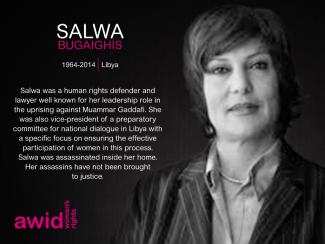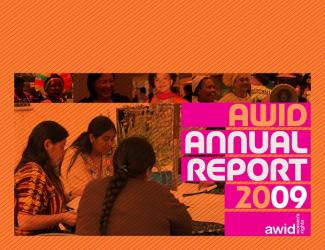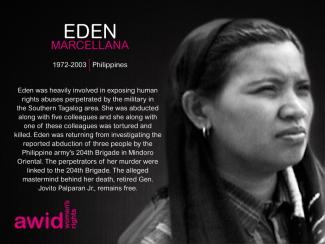
Salwa Bugaighis

Across the globe, feminist, women’s rights and gender justice defenders are challenging the agendas of fascist and fundamentalist actors. These oppressive forces target women, persons who are non-conforming in their gender identity, expression and/or sexual orientation, and other oppressed communities.
Discriminatory ideologies are undermining and co-opting our human rights systems and standards, with the aim of making rights the preserve of only certain groups. In the face of this, the Advancing Universal Rights and Justice (AURJ) initiative promotes the universality of rights - the foundational principle that human rights belong to everyone, no matter who they are, without exception.
We create space for feminist, women’s rights and gender justice movements and allies to recognize, strategize and take collective action to counter the influence and impact of anti-rights actors. We also seek to advance women’s rights and feminist frameworks, norms and proposals, and to protect and promote the universality of rights.
“It’s the indigenous knowledge and the practices that have always supported food sovereignty and this knowhow is in the hands of the women … Ecofeminism for me is the respect for all that we have around us.”
Mariama Sonko
Interview to The Guardian
เป็นกระบวนการเดียวกันและกำหนดเวลาเดียวกันทุกประการ โปรดใช้แบบฟอร์มเดียวกันนี้ในการส่งกิจกรรมของคุณ ไม่ว่าจะเป็นกิจกรรมที่จัดแบบพบกันทางกายภาพ ทางออนไลน์ หรือทั้งสองแบบ (ไฮบริด)
لمزيد من الأسئلة، يرجى استخدام نموذج الاتصال. سنستمر في تحديث هذه الوثيقة بناءً على الاستفسارات التي نتلقاها منك!


Our 2009 Annual Report includes highlights of another busy year of action and reflection at AWID as we implement our commitment to boldly, creatively and effectively contribute to the advancement of women’s rights and gender equality worldwide.
In the report you can find out about our programmatic achievements, membership, finances, what to watch out for in 2010, as well as information about our Board and Staff.
To strive for abundance, and break from this chronic scarcity, the WITM survey is an invitation for feminist and gender justice advocates to engage with the journey of collective evidence and case building to mobilize more & better money, taking back the power in today’s funding ecosystem. In solidarity with movements that continue to be invisibilized, marginalized and without access to core, long-term, flexible and trust-based funding, the WITM survey highlights the actual state of resourcing, challenges false solutions, and points to how funding models must change for movements to thrive and meet the complex challenges of our times.
Ȃurea Mouzinho is a feminist economic justice organizer and advocate from Luanda, Angola. Rooted by a pan-African, socialist and decolonial feminist politics and practice, in 2016 she co-founded and has since been a co-coordinator of Ondjango Feminista, a feminist collective working to advance a transformative women’s rights and gender justice agenda in Angola through consciousness-raising, mobilisation and advocacy. Her 10-year work history encompasses roles in research, project-management, grant-making, advocacy and movement-building primarily on issues at the intersection of women's rights, economic policies and social justice. She has written on the history and challenges for women's organising in Angola, the interplay between extractivism, militarisation and violence against women in Mozambique, and the contemporary economic liberatory practices of African peoples worldwide. Currently, Ȃurea works as policy advocacy and campaigns coordinator at the Global Alliance for Tax Justice (GATJ), leading the alliance's work on tax and gender. Ȃurea is a strategic advisor for Eyala, an alumni and regular contributor to FEMNET's African Feminist Macroeconomics Academy (AFMA) and has previously served as advisor for Sub-Saharan Africa for FRIDA-The Young Feminist Fund. She is trained in economics (University of Cape Town, Monash University) and has a Masters in Development Studies from SOAS, University of London.
Ȃurea has a loud laugh, is a proud house-plant caretaker, and enjoys strolling the beaches of the Angolan Atlantic coast followed by slow evenings laying on her carpet. She occasionally tweets on @kitondowe.
AWID’s Tribute is an art exhibition honouring feminists, women’s rights and social justice activists from around the world who are no longer with us.
This year’s tribute tells stories and shares narratives about those who co-created feminist realities, have offered visions of alternatives to systems and actors that oppress us, and have proposed new ways of organising, mobilising, fighting, working, living, and learning.
49 new portraits of feminists and Women Human Rights Defenders (WHRDs) are added to the gallery. While many of those we honour have passed away due to old age or illness, too many have been killed as a result of their work and who they are.
This increasing violence (by states, corporations, organized crime, unknown gunmen...) is not only aimed at individual activists but at our joint work and feminist realities.
The portraits of the 2020 edition are designed by award winning illustrator and animator, Louisa Bertman.
AWID would like to thank the families and organizations who shared their personal stories and contributed to this memorial. We join them in continuing the remarkable work of these activists and WHRDs and forging efforts to ensure justice is achieved in cases that remain in impunity.
“They tried to bury us. They didn’t know we were seeds.” - Mexican Proverb
It took shape with a physical exhibit of portraits and biographies of feminists and activists who passed away at AWID’s 12th International Forum, in Turkey. It now lives as an online gallery, updated every year.
To date, 467 feminists and WHRDs are featured.

The 1st drafting session on the outcome document for the 3rd Financing for Development Conference

This information will only be available when registration opens.



